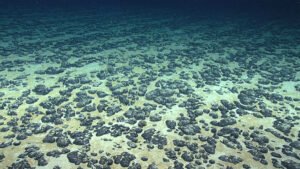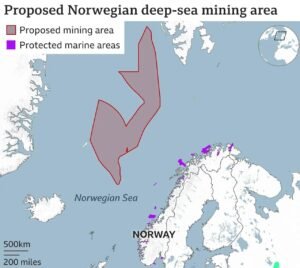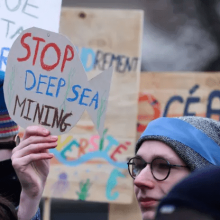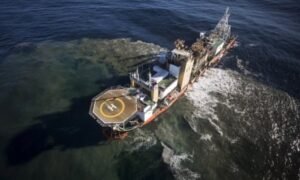Norway would become the first country in the world to move forward with deep-sea drilling after voting on January 9 to open its waters to exploration.
Norway’s parliament has approved commercial mineral exploration in the country’s Arctic waters even after environmental concerns pushed back against the move.

The proposal received an 80-20 vote in Norway’s Parliament after attracting cross-party support. In a major step towards commercial deep sea drilling, the country’s parliament has formally agreed to allow exploration of around 108,000 square miles of Arctic seabed between Norway and Greenland, an area larger than the UK. Lawmakers passed the measure on Tuesday, the Norwegian Offshore Directorate said in a website statement.
Why are the influentials running towards ‘Deep sea Mining’ ?
With increasing technological progress, the demand for mineral resources is increasing. As resources on land become scarce, industrialists turn to mine resources from the ocean floor to meet these needs.
The deep ocean, one of the world’s last untouched habitats, has long been eyed for its vast trove of resources. Deep-sea mining is an emerging industry that extracts minerals from the ocean surface. These include manganese nodules, seafloor massive sulfides, zinc, gold and cobalt crust.

These minerals increase their potential economic value and their practical interest in various industries, including technology, manufacturing, and energy production.
Controversy: Industrial Progress or Environmental damage?
There has been much controversy and criticism regarding the granting of deep sea mining permits, including damage due to noise, vibration, and light pollution.
In this regard, on July 10, 2023, the International Seabed Authority (ISA) began a three-week consultation in Jamaica.
About 18 states have taken a stand against deep-sea drilling in international waters. They have called for a break or suspension of the practice over environmental concerns.
Frode Pleym, head of Greenpeace Norway, told CNN that it’s a huge step in the wrong direction as the decision comes amid concerns about environmental degradation from scientists, politicians and environmental groups.

“The deep ocean in this region is home to a huge number of marine species, from krill to whales, as well as deep sea animals, many of which have not yet been discovered by humans. “We do not know what we risk losing for the exact reason that we do not know what the deep sea holds,” Pleym said.
According to a 2023 survey, sufficient amount of metals and minerals are located on the seabed of the country’s extended continental shelf.
Proponents said that extracting these raw materials from the seabed will facilitate a faster transition to a low-carbon economy and have lower environmental costs than terrestrial mining.

supporters also argued that these minerals are needed to meet the world’s green technology needs. Many critics have argued that the physical disturbance caused by mining operations can lead to habitat loss and loss of biodiversity, potentially affecting the entire food chain within these ecosystems.
Opposition from EU leaders, Scientists
Norway’s government has claimed that Deep-sea mining could be a good thing for whole Europe , as it will help reduce the continent’s dependence on China for its supply of vital minerals. But other countries, including the UK, have called for caution.
In November, more than 100 European politicians wrote an open letter to the Norwegian parliament, calling for a vote against deep-sea mining. The letter mentions the risk to marine life and the potential to accelerate climate change by disturbing the carbon locked up on the ocean floor.
Another open letter signed by more than 800 scientists around the world called for an end to deep-sea drilling, saying it could cause damage “that will be irreversible on multi-generational timescales.”

In December, Norwegian politician Bard Ludwig Thorheim told a news agency that the environmental bar for deep-sea mining had been set high. “We believe, and hope, that this will become the international standard for this activity,” he said.
In addition to external criticism, the Norwegian government has also faced pushback from its own experts. The Norwegian Institute of Marine Research (IMR) said the government took estimates from a small research area and applied them to the entire area planned for drilling. It estimated that another five to 10 years of research into the impact on the species is needed.
Only after Completion of all environmental studies
If the plan is approved, the Norwegian government does not want to start mining for important minerals immediately. Instead, companies must submit proposals for licenses that will be voted on a case-by-case basis in parliament.
The Norwegian government says it is taking precautions and will only start issuing licenses once more environmental studies are completed.
Approval of deep-sea mining would put Norway at odds with both the UK and the European Commission, the EU’s executive arm, which have pushed for a temporary ban over environmental concerns.

Walter Sognnes, co-founder of Norwegian mining company Loke Minerals, told the BBC: “We will have a relatively long period of exploration and mapping activity to close the knowledge gap about environmental impacts.”
Amount of Investment needed for this ‘expensive’ move
Loke Minerals’ Mr Sognes added that the government’s plan would bring much-needed investment from the private sector into deep-sea environment research, as Developing knowledge in the deep ocean is very expensive.
Campaigners argued that more investment should be made to recycle existing minerals. The Environmental Justice Foundation estimated in a report that 16,000 tons of cobalt per year, about 10% of annual production, could be recovered through improved collection and recycling of mobile phones.

The Norwegian government says that seabed minerals offer an exciting new industry and that “extraction will only be allowed if the industry can demonstrate that it can be done in a sustainable and responsible manner.”
Although Norway’s proposal concerns its national waters, discussions are ongoing as to whether licenses can be issued for international waters. The International Seabed Authority (ISA)– a UN-affiliated body, will meet this year to try to finalize the rules, with a final vote expected in 2025.










